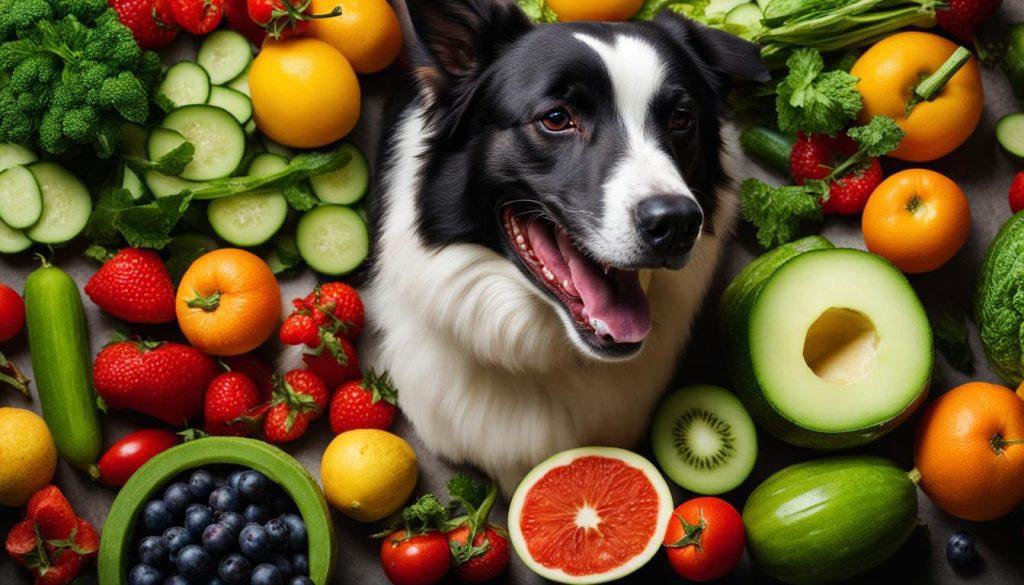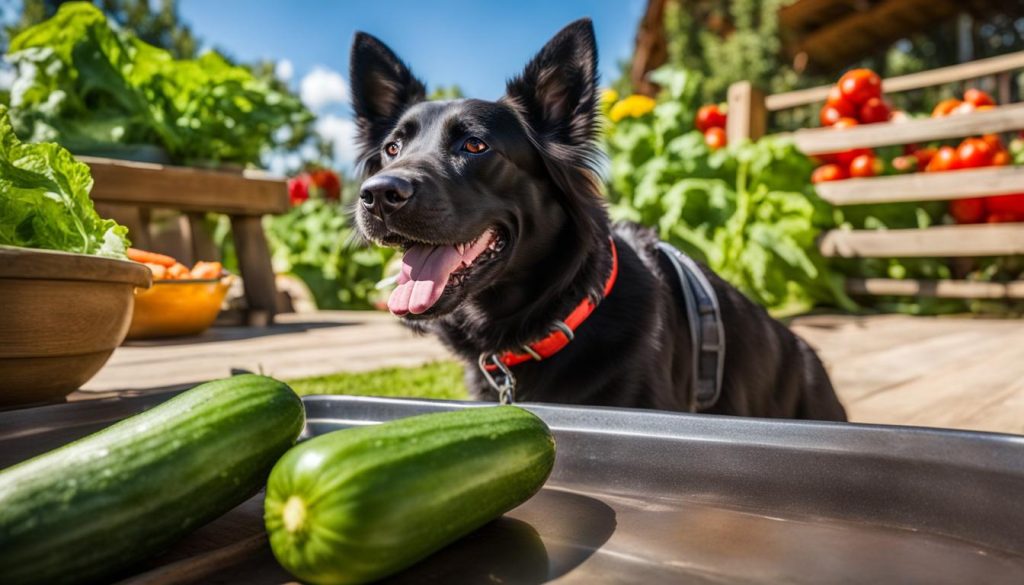As a devoted dog owner, I frequently face the puzzle of which human foods are canine-compliant. One such food under the spotlight is the humble cucumber. If you’ve been eyeing that green, crunchy veggie and wondering, “can dogs eat cucumbers,” rest assured, the answer is a refreshing yes. Cucumbers are not only non-toxic but also among the dog-friendly fruits and vegetables that can be shared with our furry pals in moderation. They’re brimming with hydration and loaded with nutrients that can be beneficial for our dogs.
While I’m eager to incorporate new treats into my dog’s diet, I also understand the importance of proceeding with care. Is cucumber safe for dogs in any quantity, and are there preferred ways to serve it? Ensuring that my canine companion enjoys his snacks safely is paramount. So, let’s dive into the world of cucumbers and canines to explore how this crisp vegetable can fit into a dog’s diet responsibly.
Can Dogs Eat Cucumbers? Yes, they can – in moderation.
- Cucumbers are safe, non-toxic treats for dogs when given in moderation.
- They’re a hydrating snack with a mix of vitamins, minerals, and fiber, beneficial for canine health.
- Portion control is vital—introduce cucumbers cautiously and observe your dog’s reaction.
- Consult with a vet for personalized feeding guidelines based on your dog’s dietary needs.
- Awareness of any potential risks, like choking hazards, can ensure safe cucumber consumption.
- Get creative with serving methods to make cucumbers an enticing treat for your dog.
Understanding Canine Dietary Needs and Cucumber Safety
When considering the inclusion of human food into my dog’s diet, my foremost concern is always their health and wellbeing. Apart from the regular kibble or canned food, I often ponder over what else I can share with my four-legged friend. It’s reassuring to know that cucumbers can be part of a balanced canine diet and cucumber consumption can offer health benefits when given correctly.

Are Cucumbers Non-Toxic for Dogs?
As a dedicated pet parent, I’m relieved to understand that cucumbers are non-toxic for dogs. They can enjoy the crunchy texture and freshness of this green vegetable without the worry. In addition, cucumbers bring a suite of vitamins and minerals that contribute positively to canine health. Ensuring a safe introduction of cucumbers into their diet is a step I take seriously, always considering my dog’s unique dietary needs.
Recommended Cucumber Portion for Dogs
Feeding guidelines for dogs and cucumbers emphasize moderation. Through consultation with veterinarians, I’ve learned that a single cup of cucumber—about two-thirds of the vegetable—makes a safe treat with minimal calories. It’s a great way to provide a snack without overburdening my pet’s daily intake with unwanted extra calories.
The Importance of Moderation in Treats
I’m mindful that, like any treat, cucumbers should only be given in moderation, even with their hydrating benefits and low-calorie profile. It’s tempting to give in to those pleading eyes for more, but I know that a well-measured approach benefits my dog’s overall health the most. As part of responsible pet ownership, I always aim to ensure that treats like cucumber supplement their diet in a balanced way, preventing any digestive upsets or weight gain.
Health Benefits of Feeding Cucumbers to Dogs
As a conscientious pet parent, I’m always on the lookout for healthy snacks for my furry friend, and I’ve found that the benefits of feeding cucumbers to dogs are numerous. Not only do cucumbers serve as a low-calorie treat, but they also deliver essential hydration — a win-win for dogs that need to keep cool and stay in shape. Let’s dive into some of these paw-sitive perks that make cucumbers a superb alternative treat for dogs.

Hydration and Nutrient Content
I’ve noticed how much my dog enjoys the crunch of a fresh cucumber, and beyond the texture, it’s packed with hydration — perfect for those hot summer days. Cucumbers consist mainly of water, which can help keep my canine companion hydrated between meals. Along with their refreshing nature, they’re also rich in vitamins K and C, as well as minerals like magnesium and potassium, contributing to my dog’s overall health and vitality.
Low-Calorie Count for Weight Management
Watching my dog maintain a healthy weight is crucial, and cucumbers fit perfectly into this equation. The low-calorie count in cucumbers makes them an ideal snack for dogs on a diet. By substituting calorific treats with cucumbers, I can reward my dog without adding unnecessary weight, thereby promoting a healthier lifestyle and preventing obesity, which is a growing concern among pets.
High Fiber for Gut Health
Another aspect I appreciate about cucumbers is their fiber content. A diet with an adequate amount of fiber is essential for a dog’s gut health, easing digestion and even aiding in regular bowel movements. While my dog’s main diet provides most of what he needs, the inclusion of cucumber as a treat adds that extra bit of fiber to ensure his digestive system runs smoothly.
Remember, while cucumbers are a nutritious snack, they should only complement your dog’s diet and not replace their regular, balanced meals. Always consult your vet when introducing new foods to your dog’s regimen.
Can Dogs Eat Cucumbers: Potential Risks and Precautions
When considering the health hazards to worry about with human foods for our furry friends, it’s imperative to note that while cucumbers are healthy, they’re not without risks. For instance, the risks of feeding cucumbers to dogs include potential choking hazards, particularly if your dog is one to gobble up snacks in a single bite. To mitigate this risk, I always suggest cutting cucumbers into small, manageable pieces before offering them to your pet.
Another factor to consider pertains to cucumber-related dog health issues, such as the presence of cucurbitacin. This compound can cause gastrointestinal distress in some dogs. I find that peeling cucumbers and removing the seeds can decrease the risk of any stomach upset. Furthermore, for our peace of mind and the health of our canine companions, we should be cautious about the cucumbers’ origins. Organic cucumbers or a thorough washing can reduce exposure to harmful pesticides.
Every dog is an individual with its own preferences and health considerations, making it vital to observe how your dog reacts to cucumbers and to consult with your vet with any concerns. Taking these simple precautions ensures the health benefits of cucumbers can be enjoyed without worry.
Dog-Friendly Cucumber Serving Ideas
When I ponder cucumber recipes for dogs, I always prioritize both safety and enjoyment. One innovative way to serve cucumbers is slicing them up and inserting them into interactive puzzle toys. This fun feeding idea not only provides a healthy snack but also enriches my furry friend’s mind as they work for their treat. It’s a win-win that keeps tails wagging.
Moreover, for a creative twist, I’ve taken to crafting mini cucumber sandwiches by smearing a touch of dog-safe peanut butter between two crisp slices. These adorable bite-sized munchies are a hit every time and make for excellent dog-friendly cucumber preparations. To cater to meat lovers, I occasionally soak cucumber chunks in a savory meat broth, which adds an irresistible flavor even the pickiest pups can’t ignore. It’s astonishing how a simple cucumber can transform into a variety of delightful treats with just a little imagination!
Conclusion
As we wrap up our discussion, it’s clear that cucumbers offer several benefits for our canine friends. These refreshing, crispy treats can be a great addition to a dog’s diet, albeit in moderation. From my personal experience, alongside information gathered from various trusted sources, the consensus supports cucumbers as a healthy snack option. They are especially useful for hydrating our pets during the warmer months and can play a role as a low-calorie treat during training or as a supplement in their regular diet.
Cucumber Benefits for Dogs
Cucumbers are a veterinarian-approved snack that provides hydration and beneficial nutrients without packing on excess calories. Their signature crunch can also be a source of entertainment for our dogs, though individual preferences do vary. Fully grasping the summary of feeding cucumbers to dogs requires acknowledging the balance between taste preference and nutritional value, making cucumbers a versatile treat to occasionally incorporate into our dog’s feeding regimen.
Expert Advice and Final Recommendations
For a veterinarian-approved cucumber diet for dogs, consulting with a professional is paramount. They can offer advice tailored to your dog’s health, age, and dietary needs. My final recommendation? Use cucumbers as a supplement to a balanced diet, and always introduce any new food slowly to avoid any adverse reactions. Overall, cucumbers are a canine-friendly option that, when served appropriately, can contribute positively to our beloved pets’ wellbeing.
FAQ
Can dogs eat cucumbers?
Absolutely! Dogs can enjoy cucumbers as part of their diet. These veggies are safe for dogs and fall under the category of dog-friendly fruits and vegetables. Just ensure they are given in moderation and appropriately prepared to prevent choking.
Are cucumbers non-toxic for dogs?
Yes, cucumbers are non-toxic for dogs. They can be a refreshing and hydrating treat that is safe when considering canine health. However, always introduce any new food item into your dog’s diet gradually to gauge their response.
What is the recommended cucumber portion for dogs?
The recommended portion of cucumber for your dog depends on their size and dietary needs. Generally, a couple of slices are sufficient as an occasional treat. It’s best to consult with your vet to determine the appropriate serving size for your specific dog.
Why is moderation important when feeding cucumbers to dogs?
Moderation is key to maintaining a balanced diet for your dog. Cucumbers should be considered a treat, not a meal replacement, and offered in moderation to prevent digestive issues and ensure your pet gets all their nutritional needs from their primary diet.
What hydration and nutrient content do cucumbers provide for dogs?
Cucumbers are high in water content, making them a great source of hydration. They also contain nutrients like vitamins K and C, potassium, and magnesium, which are beneficial to your dog’s overall health.
How does cucumber’s low-calorie count help with weight management?
Cucumbers are low in calories, which makes them an ideal treat for dogs that are overweight or need to manage their weight. Swapping out higher-calorie snacks with cucumbers can help maintain a healthy weight without sacrificing treat time.
What are the benefits of high fiber in cucumbers for gut health?
The fiber in cucumbers can aid in digestion and promote gut health in dogs. As dietary fiber helps regulate bowel movements, feeding cucumbers can contribute to your dog’s digestive well-being.
Are there any health hazards to worry about when feeding cucumbers to dogs?
While cucumbers are generally safe, there are a few risks to consider, such as choking hazards for dogs that do not chew their food well, or the potential for gastrointestinal upset if a dog eats too much. Offering bite-sized pieces and introducing cucumbers slowly into your dog’s diet can mitigate these risks.
Can dogs indulge in cucumber recipes made for them?
Yes, dogs can enjoy cucumber-based recipes made specifically for canine consumption. You can include cucumbers in homemade dog treats or meals, ensuring that all other ingredients are also safe for dogs. Just be creative and keep in mind your dog’s taste preferences and dietary restrictions.
What are some dog-friendly cucumber preparations?
Cucumber can be served to dogs in various ways. Offer fresh cucumber slices, mix chunks of cucumber into their regular food for added crunch, or freeze cucumber pieces for a cool summer treat. Always ensure that the cucumber is clean and free from any seasonings or dressings that can be harmful to dogs.





